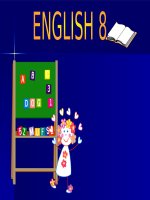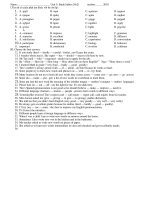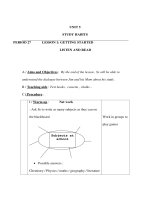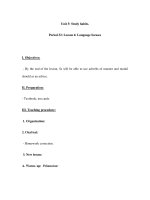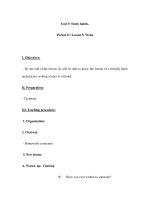Unit 5 STUDY HABIT Lesson 3
Bạn đang xem bản rút gọn của tài liệu. Xem và tải ngay bản đầy đủ của tài liệu tại đây (64.17 KB, 2 trang )
<span class='text_page_counter'>(1)</span><div class='page_container' data-page=1>
<b> Unit 5: STUDY HABIT</b>
<b> LESSON 3: READING (1)</b>
(Language…….. important words)
<b>Aims: To help the students know some good ways of studying vocabulary.</b>
<b>Objectives: By the end of the lesson the students will be able to choose a suitable way of learning </b>
vocabulary for themselves.
<b>Skills: Reading, Speaking</b>
<b>Teaching aids: poster, book, cues.</b>
Languages:
<b>Grammar: </b>
<b>Vocabulary: make a list, mother tongue, learn by heart, piece of paper, stick, come </b>
across, underline, highlight.
<b>TIME</b> <b>PROCEDURE</b> <b>T’S ACTIVITIES</b> <b>STS’ ACTIVITIES</b>
4’ <i><b>I.</b></i> <i><b>WARMER: Shark attack</b></i><sub>VOCABULARY</sub> - Controls the game - Play game
20’
<i><b>II.</b></i> <i><b>PRE- READING:</b></i>
<i><b>1.</b></i> <b>Pre-teach vocabulary :</b>
- To make a list (v): viết thành 1 danh sách
- mother tongue (n): tiếng mẹ đẻ
- to learn by heart (v): học thuộc lòng
- piece of paper (n): mẫu giấy vụn
- to stick (v): daùn
- to underline (v): gạch dưới
- to highlight (v): tô đậm
- to come across (v): lướt qua.
<b>Rub out and remember :</b>
<i><b>2.</b></i> <b>Set the scene :</b>
We are going to learn some good ways of
studying vocabulary.
<i><b>3.</b></i> <b>True or false prediction statements: </b>
<b>(1 page 50)</b>
a. All laguage learners write the meaning of new
words in their mother tongue.
b. Some learners write examples of words they
want to learn.
c. Every learner tries learn all new words they
come across.
d. Many leaners only learn new words that are
important.
a b c d
- Follows the steps
for presenting
vocabulary.
- Gives the common
idea of the lesson.
- Sticks the poster on
the board and run
through.
- Listen and observe
what the teacher
does.
- Listen
- Listen and guess.
15’ <i><b>III.</b></i> <i><b>WHILE- READING:</b></i> - Gives time for - Read to check.
Period: 30
</div>
<span class='text_page_counter'>(2)</span><div class='page_container' data-page=2>
<i><b>1.</b></i> <b>Read to check True or False </b>
<b>statements:</b>
<b>Key: </b>
a b c d
<b>F T F T</b>
<i><b>2.</b></i> <b>Questions :</b>
a. Do language learners learn words in the same
ways?
b. Why do some learners write examples
sentences with new words?
c. What do some learner do in order to
remember words better?
d. Why don’t some learners learn all the new
words they come across?
<b>Checking by: Lucky Number</b>
<b>Key:</b>
a. No. Language learners learn words in
different ways.
b. Because these example sentences help them
remember the how to use the words in the right way.
c. To remember words better, some learners
even write each word and it’s use on a small piece of
paper and stick it somewhere in their house.
d. Because they want to learn only the
important words.
reading the passages
and check.
- Asks the students
to read the passages
more carefully
again. And answer
the questions in
groups.
- Read the passages
and answer the
questions.
5’
<i><b>IV.</b></i> <i><b>POST- READING:</b></i>
<i><b>Discussion</b></i>
<i><b>1.</b></i> How do you learn your vocabulary?
<i><b>2.</b></i> What vocabulary learning ways do you
choose to learn your new words? Why?
<i><b>3.</b></i> Do you think it’s easy to learn new
words now?
- Gives more time
and questions for
discussing
- Discuss the
questions.
1’ <i><b>V.</b></i>- Learn the lesson carefully.<i><b>HOMEWORK:</b></i>
- Prepare for the next lesson.
- Gives home
assignment.
- Take note.
<b>Notes :</b>
</div>
<!--links-->
